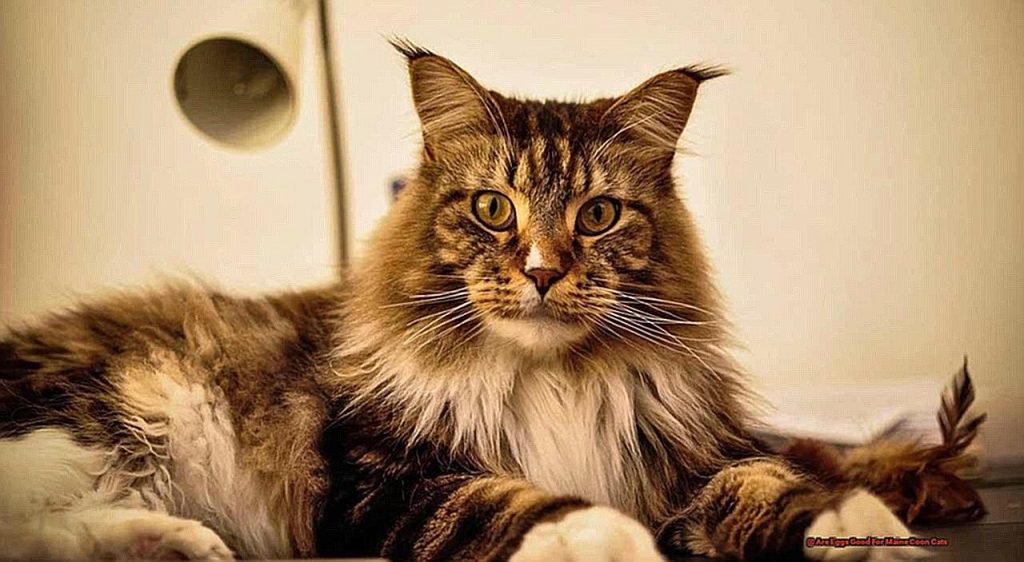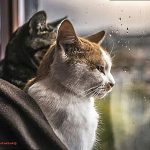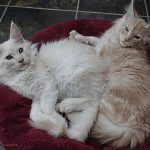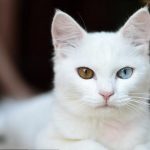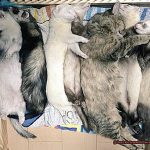Are you on the hunt for a simple and wholesome addition to your feline’s meal plan? Look no further than eggs.
These versatile protein sources are not only a staple in our own diets, but they also offer a plethora of benefits for our majestic Maine Coons. From promoting glossy coats to supporting strong muscles, eggs are packed with essential nutrients that can greatly enhance your cat’s health and happiness.
So, let’s discover the amazing benefits of eggs for your beloved companion.
Are Eggs Good For Maine Coon Cats?
Contents
If you own a Maine Coon cat, you know that they are a special breed known for their large size, playful personalities, and luxurious coats. As a responsible pet owner, it’s natural to want to provide your feline friend with the best possible nutrition to keep them happy and healthy.
With the rise of natural and raw diets for pets, you may be wondering if eggs are a good addition to your Maine Coon cat’s diet.
As an expert on the topic, I am here to shed some light on this common question and provide insights based on my first-hand knowledge and experiences.
The Nutritional Benefits of Eggs for Maine Coon Cats
Eggs are a nutrient-dense food that contains high-quality protein, essential vitamins and minerals, and healthy fats. As obligate carnivores, cats require protein in their diet to maintain strong muscles and overall health. Eggs provide all nine essential amino acids that cats need, making them a complete protein source. Furthermore, eggs are rich in vitamins A, B12, and D, as well as iron and selenium – all important nutrients for maintaining a healthy immune system and promoting optimal organ function.
Incorporating eggs into your Maine Coon cat’s diet can also have benefits for their coat and skin. The healthy fats found in eggs can help improve the condition of their fur, making it softer, shinier, and less prone to shedding. This is especially beneficial for long-haired breeds like Maine Coon cats.
Introducing Eggs into Your Maine Coon Cat’s Diet
Before adding any new food item to your cat’s diet, it is crucial to consult with a veterinarian. Every cat has different nutritional needs based on factors such as age, activity level, and overall health. A vet can assess your cat’s individual needs and provide guidance on the appropriate amount of eggs to feed.
When introducing eggs to your Maine Coon cat’s diet, it is important to do so slowly and in small portions. This allows their digestive system to adjust and can help prevent any potential adverse reactions. It is also essential to cook the eggs thoroughly before serving. Raw or undercooked eggs can contain harmful bacteria such as Salmonella, which can be dangerous for cats.
Moderation is Key
Understanding Allergies in Maine Coon Cats
However, what you may not know is that Maine Coon cats have a higher risk of developing food allergies compared to other cat breeds. This is due to their genetic predisposition towards certain allergies. As an expert on all things feline, I want to shed light on the potential for food allergies in Maine Coon cats, specifically when it comes to eggs.
Eggs are one of the most common allergens for cats, including Maine Coons. The proteins found in eggs, specifically in egg whites, can trigger an allergic reaction in some cats. This means that even if your cat has been happily devouring eggs before without any issues, they can suddenly develop an allergy towards it.
So, how do you know if your Maine Coon cat is allergic to eggs? Allergies in cats can manifest in various ways, such as skin irritation, gastrointestinal issues, and respiratory problems. Some common symptoms of food allergies in Maine Coon cats include scratching excessively, vomiting, diarrhea, and ear infections. If your cat is exhibiting any of these symptoms, it is important to take them to a veterinarian for proper diagnosis and treatment.
If your veterinarian suspects that your cat may have an egg allergy, they may recommend a food allergy test. This will help determine if eggs or any other food ingredient is the cause of the reaction. However, it’s important to note that not all Maine Coon cats will be allergic to eggs. Each cat is unique and may have different reactions to different types of food. Therefore, it’s crucial to monitor your cat’s behavior and health after introducing any new food into their diet.
In some cases, even if a cat is not allergic to eggs, they may have a sensitivity or intolerance towards them. This can also lead to digestive issues and discomfort for your cat. So, even if your cat is not showing any signs of an allergic reaction to eggs, it’s still important to be cautious and monitor their health.
Debunking the Myth: Are Eggs Really Bad for Maine Coon Cats?
First off, let’s address the claim that cats, especially Maine Coons, are obligate carnivores and should only consume meat-based diets. While it’s true that cats require high levels of protein in their diet, Maine Coon cats are not strict obligate carnivores like their big cat relatives. In fact, they can benefit from a more varied diet, including some non-meat sources.
And that brings us to eggs. Many pet owners have been led to believe that eggs are bad for cats, particularly Maine Coons. However, this couldn’t be further from the truth. Eggs are a great source of protein and essential nutrients for cats. They are also easily digestible and can provide a boost of energy for our active and playful Maine Coons.
In fact, many commercial cat foods contain eggs as a key ingredient. So why the misconception? Some may argue that it stems from the concern over raw egg whites containing avidin, which can interfere with biotin absorption. But here’s the thing – this is only a concern for cats who consume large amounts of raw egg whites regularly. Cooking the eggs eliminates this risk, making them safe for cats to consume.
And here’s another interesting fact – eggs contain biotin themselves, which helps counteract any potential biotin deficiency caused by avidin. So not only are eggs safe for our Maine Coons to eat, but they also offer added nutritional benefits.
As a Maine Coon owner, you know how important it is to keep our cats’ coats shiny and healthy. Well, eggs contain essential fatty acids that can help improve the quality of their fur. So not only are eggs not bad for Maine Coon cats, but they can also actually benefit them in multiple ways.
The Importance of Protein in a Maine Coon Cat’s Diet
When it comes to their diet, we often hear conflicting opinions about what is best for them. One common myth floating around is that eggs are harmful for Maine Coon cats. But as an expert on the topic, I am here to set the record straight and explain why protein, including eggs, is crucial for the overall health and well-being of these majestic creatures.
Why Protein is Essential for Maine Coon Cats
Maine Coon cats are known for their large size and muscular build, making them one of the largest domestic cat breeds. This means they require a diet that is high in protein to maintain their strong and lean bodies. But why is protein so important for cats?
Protein is essential for cats as it provides the necessary building blocks for muscle growth and maintenance, as well as other bodily functions such as hormone production and immune system support. And with their high energy levels, Maine Coon cats have a higher protein requirement compared to other cat breeds.
How Eggs Contribute to a Healthy Diet
Eggs are considered a complete protein source, meaning they provide all nine essential amino acids in the right proportions. This makes them an excellent option for meeting a cat’s high protein requirements. And with their easily digestible protein, eggs are also a great option for cats with sensitive stomachs or digestive issues.
Along with protein, eggs also contain essential vitamins and minerals that are crucial for maintaining a cat’s overall health and well-being. These include vitamins A, D, and E, as well as minerals like iron, zinc, and selenium.
But one key nutrient found in eggs that is particularly beneficial for Maine Coon cats is taurine. This amino acid is essential for heart health and vision in cats and is found in high levels in egg yolks.
Essential Amino Acids and Vitamins Found in Eggs
Eggs are not just a delicious breakfast food for us humans, but they also contain a wealth of essential amino acids and vitamins that are crucial for the health of Maine Coon cats.
Let’s dive into the science behind why eggs are an essential addition to your cat’s diet.
Protein Powerhouse:
Maine Coon cats are large and active breeds, meaning they require a high-protein diet to maintain their muscle mass and energy levels. Eggs are an excellent source of high-quality protein, containing all nine essential amino acids that cannot be produced by your cat’s body. These amino acids are the building blocks of protein and are crucial for various functions in your cat’s body, from tissue repair to hormone production.
Taurine Triumph:
One of the most important amino acids found in eggs is taurine. This essential nutrient plays a vital role in the health of Maine Coon cats, as it helps with digestion, heart function, and vision. In fact, taurine deficiency is a significant concern in this breed and can lead to serious health issues such as heart disease and blindness. Luckily, eggs are a rich source of taurine, making them an excellent addition to your cat’s diet.
Vitamin Boost:
In addition to essential amino acids, eggs also contain other vital nutrients such as vitamins A, B12, and D. These vitamins are essential for maintaining a healthy coat, strong bones, and overall well-being in Maine Coon cats. Vitamin A is crucial for vision and immune function, while vitamin B12 helps with energy metabolism and maintaining a healthy nervous system. Vitamin D is also vital for calcium absorption and bone health.
Feeding Tips:
When it comes to feeding eggs to your Maine Coon cat, it is important to cook them thoroughly to avoid any potential risks of Salmonella or E.coli contamination. Raw eggs can also interfere with the absorption of biotin, another important B vitamin for cats. Therefore, it is best to feed cooked eggs in moderation as part of a well-balanced diet for your furry friend.
Satisfying Your Cat’s Natural Instincts with Eggs
While commercial cat food may provide the necessary nutrients, it’s always good to incorporate some fresh and natural foods into your cat’s diet. And what better way to do that than with eggs?
Eggs are not only a delicious treat for us humans, but they also offer numerous benefits for our furry friends. In this article, we’ll dive into the world of eggs and how they can satisfy your Maine Coon cat’s natural instincts.
The Power of Protein
Maine Coon cats are known for their large size and muscular build, making them quite the active cats. Therefore, it’s crucial to provide them with a protein-rich diet to support their active lifestyle. And eggs are an excellent source of protein. In fact, one large egg contains approximately 6 grams of high-quality protein, making it a perfect addition to your cat’s meals.
Vitamins and Minerals Galore
Aside from being an excellent source of protein, eggs also contain essential vitamins and minerals that are beneficial for your cat’s overall health. These include Vitamin A, D, E, and B12, as well as iron and selenium. These vitamins and minerals help support various bodily functions such as immune system health, bone and muscle strength, and healthy skin and coat.

Moderation is Key
While eggs offer many benefits for Maine Coon cats, it’s important to note that they should not be the main source of protein in their diet. It’s recommended to give eggs in moderation as a supplement to their regular meals. This will ensure that your cat gets a balanced diet without causing any imbalances or deficiencies.
Cooked is Best
Raw eggs may be a popular choice among some pet owners, but it’s important to avoid feeding them to your Maine Coon cat. Raw eggs can contain harmful bacteria such as Salmonella, which can make your cat sick.
It’s best to cook eggs thoroughly before feeding them to your cat. This also helps in removing the shell, which can be a choking hazard for cats.
Moderation is Key: How Often Should You Feed Eggs to Your Maine Coon Cat?
With their love for food and their high protein needs, it’s no surprise that you’re considering adding eggs to their diet. But before you start cracking those shells, it’s important to understand the importance of moderation when it comes to feeding eggs to your Maine Coon cat.
Why Moderation is Crucial?
Eggs are a fantastic source of protein and essential nutrients for cats. However, like with any food, too much of a good thing can be harmful. Feeding too many eggs to your cat can lead to health issues such as obesity and pancreatitis. This is why it’s crucial to stick to the recommended amount of eggs in your cat’s diet, which is around 10%.
How Much is Too Much?
For a 10-pound Maine Coon cat, one small egg per day is enough to meet their daily protein needs. This also includes any other food that may contain eggs, such as treats or wet food. It’s important to keep track of how many eggs your cat is consuming in their overall diet and adjust accordingly.
Consider Your Cat’s Overall Diet
It’s essential to consider your cat’s overall diet when deciding how often to feed them eggs. If your cat already has a high-protein diet, adding eggs on top of that may not be necessary. On the other hand, if your cat is on a lower protein diet, then incorporating eggs can be beneficial. Consulting with your veterinarian can also help determine if your cat needs more or less eggs in their diet.
Age and Health Matter
Just like with humans, age and health play a role in how well a cat can digest certain foods. Senior cats or cats with certain health conditions may not be able to process eggs as easily as younger, healthy cats. In these cases, it’s best to consult with your veterinarian before adding eggs to their diet.
Monitor Your Cat’s Weight and Health
It’s crucial to monitor your cat’s weight and overall health when feeding them eggs. If you notice any changes in their weight or behavior, it may be a sign that they are getting too many eggs in their diet. Adjust the amount of eggs accordingly to keep your cat healthy and happy.
Conclusion
In conclusion, eggs are a fantastic and nutritious addition to your Maine Coon cat’s diet. These protein-packed treats not only support their natural carnivorous instincts but also provide essential nutrients for a glossy coat and strong muscles. However, as with any food, moderation is key. It is important to consult with a veterinarian and monitor your cat’s overall health and weight when introducing eggs into their diet.
Despite the misconception that eggs are harmful for Maine Coon cats, they actually offer numerous benefits for our beloved breed. From being a complete source of protein to containing vital vitamins and minerals, eggs are not only safe but also beneficial for our furry companions. Just be sure to cook them thoroughly before serving and keep an eye out for any potential allergies or sensitivities.
As responsible pet owners, we want nothing but the best for our cats. By incorporating eggs into their diet in moderation, we can provide them with a simple yet wholesome addition that will enhance their health and happiness.

